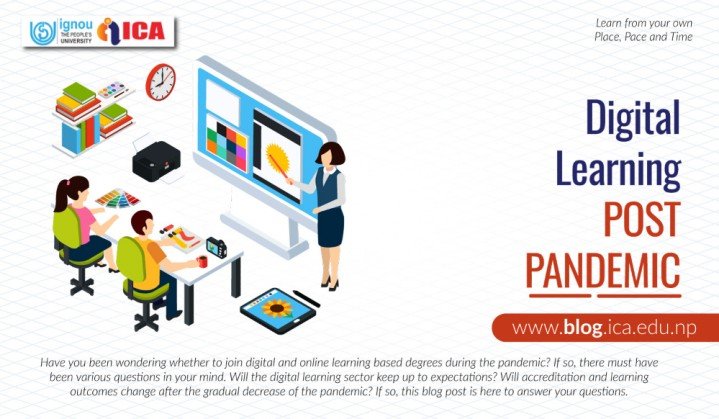
DIGITAL LEARNING POST PANDEMIC
Have you been wondering whether to join digital and online learning based degrees during the pandemic? If so, there must have been various questions in your mind. Will the digital learning sector keep up to expectations? Will accreditation and learning outcomes change after the gradual decrease of the pandemic? If so, this blog post is here to answer your questions.
The COVID-19 pandemic has hugely affected the education sector among all other sectors. A study conducted by UNESCO in 2020 suggests that close to 300 thousand students have been out of colleges in Tribhuvan University alone in Nepal. Different schools and colleges have opted to online classes and digital platforms as a mitigation mechanism to cope up with the effects of the pandemic in the education sector.
The growth of the IT sector, specifically with regards to digital and online learning is overwhelming not just in Nepal but all across the globe. The good news is that this growth trend suggests that the uptake and scalability of digital learning processes are here to stay for the foreseeable future.
In the post pandemic scenario, it is almost certain that most of the schools, colleges and universities will hope to adopt a mixed approach to the otherwise traditional teaching learning pedagogy based in physical, face-to-face approach. The emergence of the digital learning practices in education has proven to be a relatively smarter way of achieving best teaching learning outcomes. Furthermore, it would not be wrong to say that educational institutions will eventually have to reassess curriculum goals to achieve maximum productivity through the amalgamation of both physical and digital teaching learning pedagogy in the recent future now.
However, governments, educational institutions and other stakeholders must swiftly develop effective strategies to address the issues of digital divide and equitable access to IT services and internet services in hard to reach rural areas in Nepal. For now bridging the digital divide is one of the most pressing issues to be addressed without delay.
Finally, digital learning post pandemic is the new age smart learning process and it is certain to emerge as an indispensible aspect of the teaching learning pedagogy across the globe. It would be a smart choice now to choose credible and competitive digital and online learning courses because this is going to be the new normal way of both academic and non-formal education.
 01- 4579685/ 4583902/ 4578471/ 4591485
01- 4579685/ 4583902/ 4578471/ 4591485 support@ica.edu.np
support@ica.edu.np
 9818505224
9818505224


